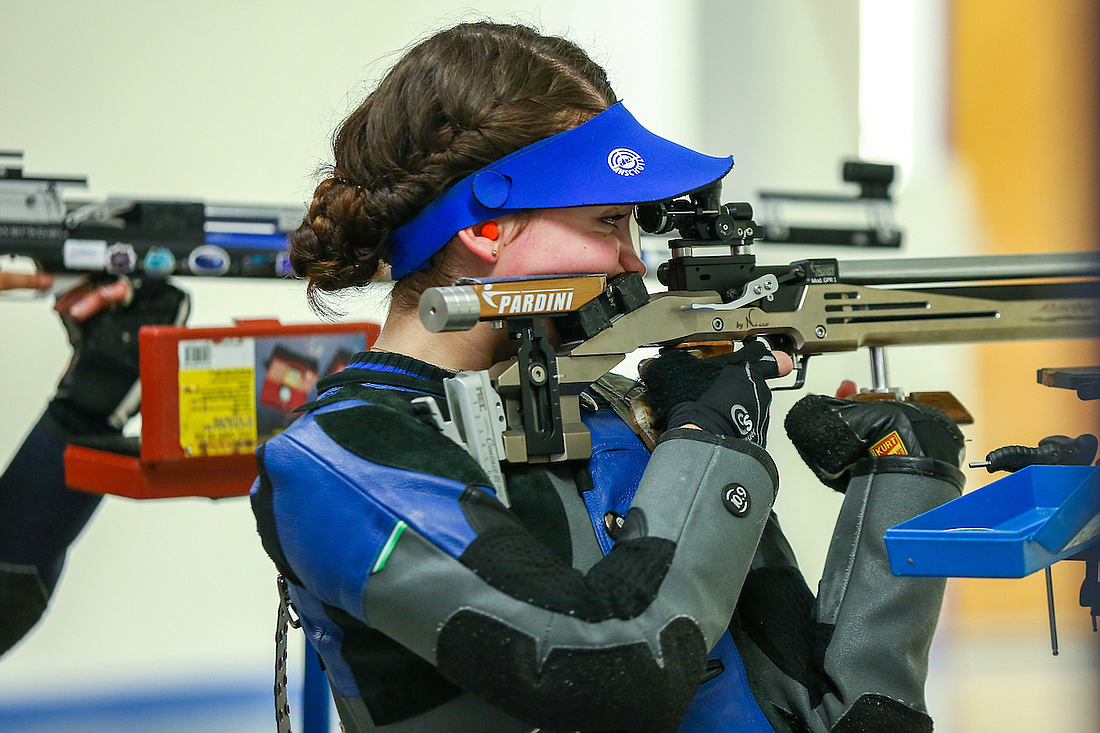- March 13, 2025
-
-
Loading

Update: Mary Tucker finished first overall in the U.S. Olympic Team Trials and is headed to Tokyo this summer for the 2020 Olympic Games.
The gun wouldn't work.
Mary Tucker's trusted air rifle, the one she had spent weeks testing and weighing and retesting, the one that had been configured to the measurements of her body down to the millimeter, was broken. It was Dec. 9, two days before Tucker, a graduate of Sarasota Military Academy and a freshman on the University of Kentucky's rifle team, was scheduled to compete in the first stage of the U.S. Olympic Team Trials in Colorado Springs, Colo.
Yes, that Olympic team, the one that will be representing our country in Tokyo this summer. Tucker is that good. She has been ever since her high school days, when she won the junior championship at the Winter Airgun Championships in 2018 and made the finals at the Rio World Cup in August. (She led the field after Day 1.) It is something Tucker started at SMA, when her mother, Jennifer Tucker-Mogensen, told her she had to participate in a sport.
"I was bad," Tucker said, able to laugh about it now. "Like, really bad. I could not figure out the positions. I'm small, so it was difficult to hold and control my gun sometimes."
That was OK at first. Tucker was doing it to make friends at that point, anyway. She wasn't invested in the sport itself — until people started telling her she would never be good enough to reach the sport's higher levels. That made her angry. It made her want to prove them wrong. Tucker quit SMA's team and began learning on her own. She taught herself how to shoot precision rifles. Five daily hours of practice in her family's garage, plus many more hours of watching YouTube videos and reading every article she could, paid dividends. Her rise in the sport was steep, eventually attracting the attention of big-time programs at the 2017 Nationals.
On her first day of recruitment eligibility, Tucker received 10 emails from college coaches, she said. She ultimately chose Kentucky for its equine finance major; Tucker loves horses and rode equestrian in high school, too.
So now Tucker is a Wildcat, and she qualifies for the U.S. Olympic Team Trials, and her gun breaks.
A gun is not like a stick in hockey or a bat in baseball. You cannot simply walk to the bench and grab another. In a sport where the difference between winning and losing is literally razor thin, knowing your gun inside and out is key. Tucker knew her old gun liked .535-gram pellets better than .530- or .540-gram pellets, for instance. She knew that because she put it through its paces. There was no time to do that with her new gun.
"I just had to wing it and see what happened," Tucker said.
What happened is this: Tucker finished the first stage of Trials in first place (1256.4), ahead of shooters such as 2016 gold medal winner Ginny Thrasher and second-place Alison Weisz (1256.0), who is a student at Mississippi. The second and final stage of the trials will take place Feb. 7-9, again in Colorado Springs, Colo. The top-two overall finishers will qualify for Tokyo.
Tucker said the chance to represent her country is something she never considered in high school. She did not even know college rifle was a thing until her junior year. But she has faced the best of the best and beaten them. She now feels comfortable asking those people for advice, and dishing it out to younger shooters if they ask. Rifle is a small community, she said, and its participants feel compelled to help those curious about it, even if those people are also competitors. In fact, Tucker said, if her advice leads to one of her competitors beating her, that will just be extra motivation.
Tucker said she wants people to know success in rifle is achievable for anyone who dedicates themselves to it.
"You don't have to be big, or fast," Tucker said. "You just have to work your trigger finger."
Tucker is hoping her own trigger finger gets her a trip to Tokyo.